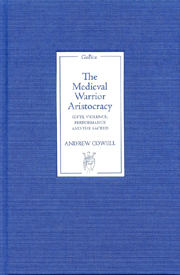Book contents
- Frontmatter
- Contents
- Acknowledgements
- Introduction
- 1 The Power of Giving
- 2 The Symbolic Constitution of the Giving Subject: William the Conqueror and Robert Guiscard
- 3 Violence and “Taking”: Towards a Generalized Symbolic Economy
- 4 Taking an Identity: The Poem of the Cid
- 5 The Sacred Kept
- 6 The Hero, Gratuity and Alterity: The Song Of Roland
- 7 The Supplemental Hero: Raoul of Cambrai
- 8 Female Integrity and Masculine Desires in The Nibelungenlied
- 9 Fractured Identities, and the Solution of Chivalry: William of Orange
- Conclusion: A New, Different Warrior Aristocracy
- Works Cited
- Index
2 - The Symbolic Constitution of the Giving Subject: William the Conqueror and Robert Guiscard
Published online by Cambridge University Press: 12 September 2012
- Frontmatter
- Contents
- Acknowledgements
- Introduction
- 1 The Power of Giving
- 2 The Symbolic Constitution of the Giving Subject: William the Conqueror and Robert Guiscard
- 3 Violence and “Taking”: Towards a Generalized Symbolic Economy
- 4 Taking an Identity: The Poem of the Cid
- 5 The Sacred Kept
- 6 The Hero, Gratuity and Alterity: The Song Of Roland
- 7 The Supplemental Hero: Raoul of Cambrai
- 8 Female Integrity and Masculine Desires in The Nibelungenlied
- 9 Fractured Identities, and the Solution of Chivalry: William of Orange
- Conclusion: A New, Different Warrior Aristocracy
- Works Cited
- Index
Summary
Up to this point, we have been analyzing antagonistic giving and the integrity-drive with an economistic approach. The honor accruing to givers expresses an underlying socioeconomic power, which is banked in the form of honor. More precisely, honor from giving expresses social ties and social obligations (“debts”) which are owed to the holder of the honor. The honor is convertible to goods and services which are the means of exercising power. Honor is thus a classic form of symbolic capital in the sense that Bourdieu uses the term in his economistic analysis of gift culture (1977, esp. Ch. 4). More prosaically, honor is the currency of the warrior aristocracy. As economic anthropologist C.A. Gregory says, “gift production must be understood as the process of production of symbols” (1982:91). But there is more at stake in this notion of the symbol than just economics. The emphasis which Duby places on the will in his remarks cited in the previous chapter, as well as Wace's interest in the dual emotions of love and fear, allows the economic and political to bleed into the ethical and psychological domains, and reinforces the notion of identity elaborated by Strathern. In this chapter, we will explore this second component of identity, honor, power and integrity more fully.
The importance of gratuity and spontaneity in gift-giving has been widely noted. For this reason no doubt, charters recording gifts in the eleventh century often stressed that the gift was “spontaneous,” and that any counter-gifts were provided purely out of “charity,” and not as part of a negotiation (Tabuteau 1988:21–2).
- Type
- Chapter
- Information
- The Medieval Warrior AristocracyGifts, Violence, Performance, and the Sacred, pp. 37 - 51Publisher: Boydell & BrewerPrint publication year: 2007



